“Neither One of Us (Wants to Be the First to Say Goodbye)” inaugurated Gladys Knight and the Pips’ partnership with songwriter Jim Weatherly, a pairing that yielded the most successful recordings of their respective careers.
“Neither One of Us” was the first of a dozen Weatherly songs recorded by Knight and the Pips, highlighted by the group’s signature hit, 1973’s “Midnight Train to Georgia.” Mississippi-born Weatherly began writing songs as a teenager, juggling his musical endeavors with his duties as the starting quarterback of the Pontotoc High School football team. He went on to serve as the backup QB at Ole Miss during the Rebels’ undefeated 1962 season, a campaign set against the backdrop of a turning point in the civil rights movement: that same autumn, the university admitted its first Black student, James Meredith, in the aftermath of violent clashes between pro-segregation white rioters and federal agents. Weatherly was named the Ole Miss starter ahead of the 1963 season, but after graduating he abandoned his football career in favor of relocating to Los Angeles with his sunshine pop band the Gordian Knot, releasing a self-titled 1968 LP on Verve Records.
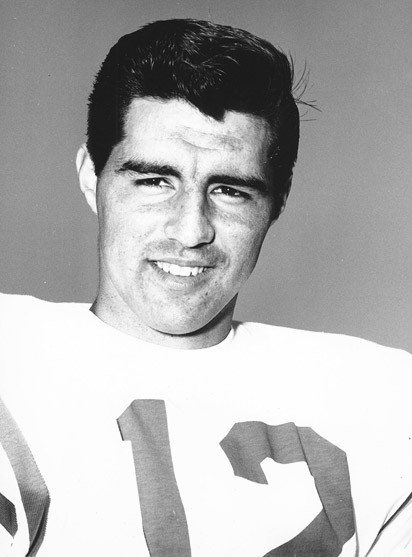
When the Gordian Knot unraveled, Weatherly’s flag football teammate Lee Majors – then the star of ABC’s primetime western The Big Valley – introduced him to actor/singer Jim Nabors, a.k.a. television’s Gomer Pyle. “Jim asked if I wanted to start writing songs,” Weatherly recalled in 2008. “What else was I going to do besides walk the streets and park cars?” He was hired as a staff writer at Nabors’ music publishing company, and when the star’s CBS television variety series ended in 1971, Weatherly signed a publishing and management deal with Larry Gordon, whose stable of writers also included Paul Williams and Harry Nilsson. Gordon helped him land a recording contract with RCA Victor, which issued his debut solo LP Weatherly in 1972; the album contains the first recordings of “Midnight Train to Georgia” (under its original title, “Midnight Plane to Houston”) as well as the poignant “Neither One of Us (Wants to Be the First to Say Goodbye),” which Gordon shopped to producer Joe Porter, who was beginning work on what would prove to be Gladys Knight and the Pips’ final recordings for Motown Records.
Atlanta native Knight, her brother Merald (a.k.a. “Bubba”), cousin Edward Patten and friend Langston George first earned national notice with the 1961 release of “Every Beat of My Heart,” which topped the Billboard R&B charts and rose to number six on the pop charts. The Pips struggled to maintain momentum, however, and while their stage act was considered one of the best in the business, they felt they could not reach the upper reaches of stardom without stronger material and savvier promotion, so in early 1966 the group signed to Motown, then at the zenith of its creative and commercial powers.
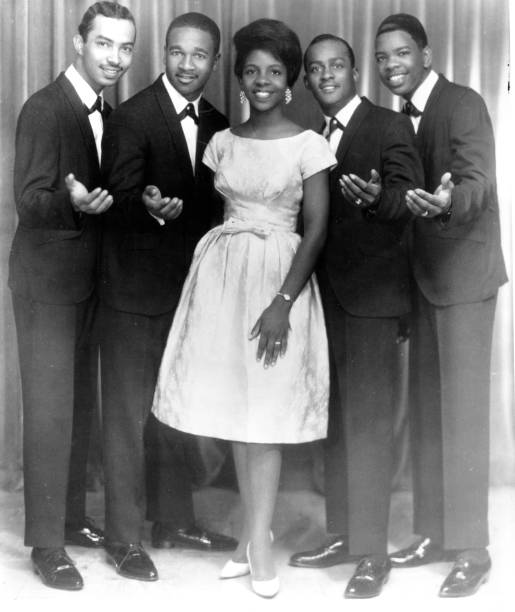
“[Knight and the Pips] were everything Motown was telling its acts they had to be when they came onboard,” writes Nelson George in Where Did Our Love Go? The Rise and Fall of the Motown Sound. “Their choreography was precise, exciting, and always timed to highlight the lyric. Onstage, the three male Pips were elegant, sepia Fred Astaires whose sweat never obscured their style. Gladys was the gospel counterpoint, moving left as the guys moved right, her Southern charm flowing sweetly from the stage.” Knight was firmly opposed to signing Motown’s offer sheet, however. “I had a lot of doubt about what Motown could do for us,” she later explained. “I thought we would have to come after the stars who were already there. When we were approached by Motown with a contract, we took a vote on whether we should accept. The guys voted to sign. I voted no. I was outvoted.”
While Knight’s instincts initially proved correct – “Diana [Ross] and the Supremes, the Temptations and Marvin Gaye were given all the hits, while we took the leftovers,” she recalled in a 2018 episode of cable network A&E’s Biography – the Pips’ fortunes transformed with the 1967 release of “I Heard It Through the Grapevine,” previously recorded by Gaye as well as Smokey Robinson’s Miracles. Motown brass rejected both versions, however, so producer and co-writer Norman Whitfield went back to the drawing board to showcase Knight’s fiery, gospel-inspired vocals, taking inspiration from Aretha Franklin’s mammoth Atlantic Records hit “Respect” and rearranging the song to mimic the trademark funk sound of Alabama’s Muscle Shoals Rhythm Section studio session crew. This third version of “I Heard It Through the Grapevine” went on to become the best-selling single in Motown history — at least until Whitfield finally convinced Motown to release Gaye’s searing, sinuous rendition, whereupon it outsold Knight’s version and topped the Hot 100 for seven consecutive weeks.
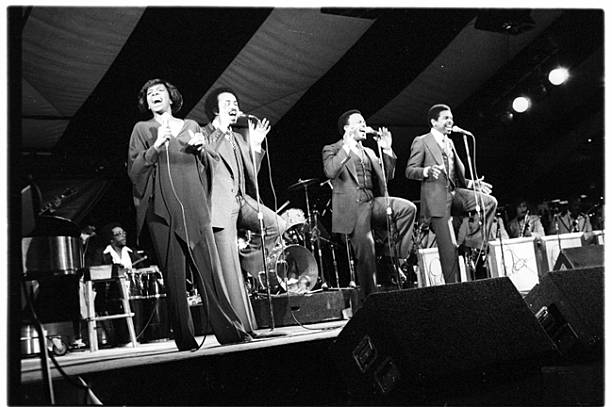
“I Heard It Through the Grapevine” nevertheless established Knight and the Pips as reliable hit-makers, and by the time they teamed with Joe Porter for what would become the Neither One of Us LP, they were afforded unprecedented control over their music. “Joe gave us creative freedom,” Bubba Knight recalled during an interview for the Complete Motown Singles box set series. “We’d take the lead sheet and the demo and mold it, and man, Joe would just sit there in the studio and tell them to turn the tape on.”
Porter recommended Knight cover Weatherly’s title ballad after hearing it on his RCA Victor album – and much to Weatherly’s surprise, she agreed. “When I wrote ‘Neither One of Us,’ I was really in a blue funk,” Weatherly recalled in a 2008 interview with the Nashville Songwriters Hall of Fame. “I came in one night, sat down on the bed and picked up my guitar. I sang the first verse to the song, and I didn’t have a lyric or a title. I didn’t have any of that. The mood that I was in totally inspired the emotion, and the emotion came out in music. The whole first verse just fell right out. When I got to the last line of the verse and said ‘Neither one of us wants to be the first to say goodbye,’ I knew I had a song. I knew that it was a really fine song. So many people I had been playing my songs for at the time would say to me ‘You write such sad songs. Why don’t you write some uptempo songs? Why don’t you write positive songs? Why don’t you do anything that is different than what you are?’ So when I wrote this song, when I finished ‘Neither One of Us,’ I closed my book and I thought ‘Well, there is another sad song nobody will ever want to hear.’ I’m really glad I was wrong about that one.”
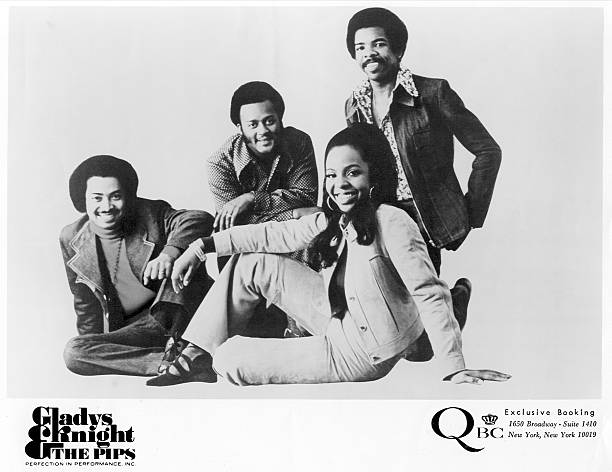
“Neither One of Us (Wants to Be the First to Say Goodbye)” heralded a significant shift from the edgy, gritty R&B formula of the Pips’ previous Motown records, embracing a more sophisticated, pop radio-ready sound. Knight recorded her lead vocal in one take at Motown’s MoWest Studios soon after the Pips completed their backing vocals; all four members of the group believed their work was done and packed their bags to return to Detroit, but en route to the airport, “we were singing the song, we got a vibe, the spirit moved us, and we realized we had to go back and lay down more vocals,” Bubba Knight recalled. “When we played that thing back, we knew we had something great.” Motown issued promotional copies of “Neither One of Us” in December 1972, around the same time Knight and the Pips began renegotiating their contract with the label; when talks broke down, the group requested its release, and while “Neither One of Us” climbed both the pop and R&B charts, Knight and the Pips jumped ship for Buddah Records, whose president Art Kass promised they would no longer be cogs in a machine. “Neither One of Us” ultimately reached number two on the Hot 100, and won a Grammy Award for Best Pop Performance by a Duo or Group with Vocals in 1974, the same year “Midnight Train to Georgia,” the group’s second Buddah release, conquered the Best R&B Performance by a Duo or Group with Vocals category.
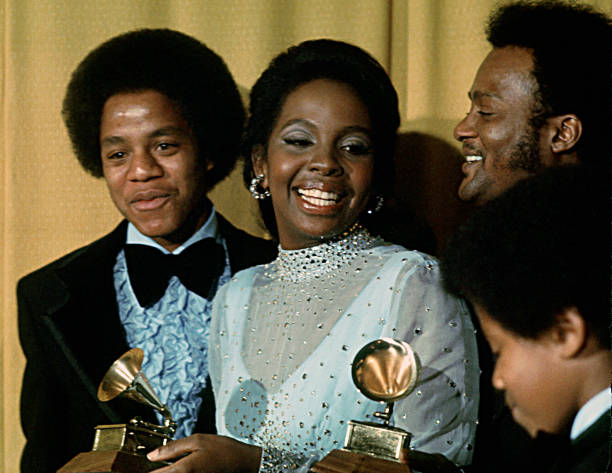
“I never really imagined writing R&B songs. I really thought I was writing country songs,” Weatherly told the Nashville Songwriters Hall of Fame. “But [Knight and the Pips] heard something in my songs. Looking back, it was probably the way they had a lot of space between lyrics. I didn’t try to fill up everything with words or move everything close together. The songs would breathe, so you were almost waiting for what the next line was, as opposed to the line hitting before you were ready to hear it.”
Gladys Knight and the Pips are not the sole interpreters of the Jim Weatherly songbook: Bob Luman reached the country charts with his reading of “Neither One of Us,” country legend Ray Price recorded no fewer than 38 Weatherly tunes, and everyone from Glen Campbell to Garth Brooks covered him along the way. But Knight’s “Neither One of Us” and “Midnight Train to Georgia” are the singles for which he’ll be remembered forever.
“I’m missing Jim Weatherly already,” Knight wrote on Twitter in 2021 following the songwriter’s death at the age of 77. “He was about life and love… We were just made for each other. We grew our lives together. I’m gonna miss him terribly and love him always.”
Related Songs






